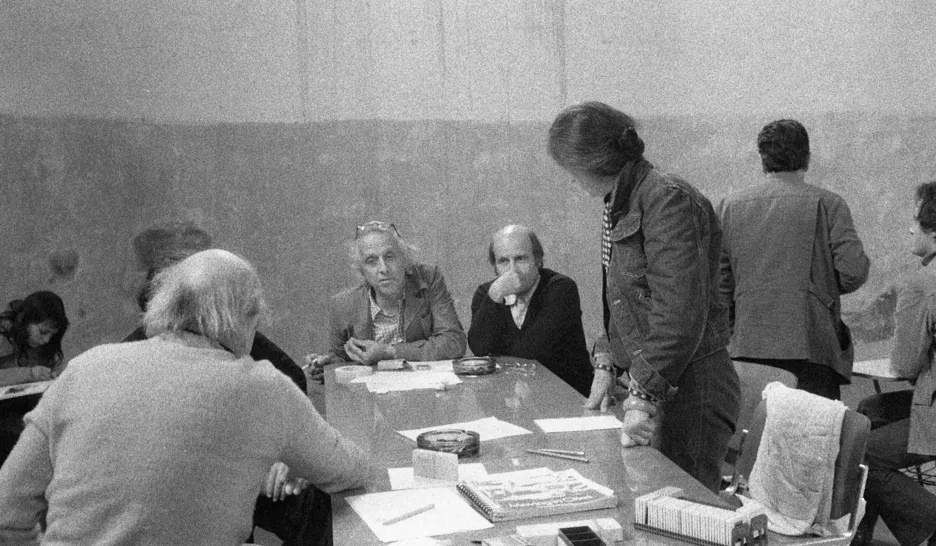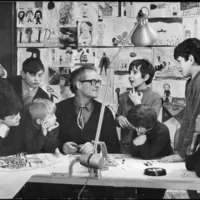Participation Makes Architecture. Reconstructing a Cross-cultural Debate (1968-1981).
Dr. Alberto Franchini

The Reference Framework for Sustainable Cities, a 2016 established online toolkit for European local authorities, includes citizen participation among its objectives. Though new technology-based participation methods open up a new area of possibilities, it is fundamental to look back on history with more refined research methods to build up a steadier theoretical framework. I think that people meeting in a certain physical environment are still an indispensable condition for building a strong community. In the 1970s place-based participation was at its peak of popularity and was being promoted by architects as a pioneering tool worldwide.
This research project investigates participation as discussed in the international network set up by Giancarlo De Carlo (1919-2005). Here, I don’t focus on this single architect and his authorship but I study the contact zones’ agency of the network under scrutiny in which De Carlo had multiple fundamental roles: promoter, organiser, mediator, supporter, and actor. Mainly, I consider the Team X meeting in Spoleto of 1976, the first six editions of the ILAUD (International Laboratory of Architecture and Urban Design) which took place in Urbino between 1976 and 1981, and the issues of the magazine Spazio e Società – Space & Society published in the same period.
ILAUD publications – Yearbooks and Bulletins – and S&S issues are the starting points of this investigation. Furthermore, I research the De Carlo archive, which also includes the S&S documents, kept at the IUAV Project Archive in Venice and the ILAUD archive kept at the Poletti Library in Modena. Correspondence and notes trace a global and multidirectional exchange of knowledge with different actors involved. Among them, I found out: some of the Team X “members”, such as Jaap Bakema (NL), Georges Candilis (GR), Alison & Peter Smithson (UK), Aldo van Eyck (NL), and Ralph Erskine (UK); and other internationally recognised figures, such as Julian Beinart (USA), Peter Blundell Jones (UK), Riccardo Dalisi (IT), Carlo Doglio (IT), Balkrishna Doshi (IN), Yona Friedman (FR), N. John Habraken (NL), Rod Hackney (UK), Herman Hertzberger (NL), Bernard Hoesli (CH), Peter Hübner (D), Donlyn Lydon (USA), Simone & Lucien Kroll (BE), Ivan Illich (AT), Donlyn Lyndon (USA), John McKean (UK), Terje Moe (NO), Renzo Piano (IT), Fritz Schwarz (CH), Waler Segal (UK), Peter Sulzer (D), John F. C. Turner (UK), and Colin Ward (UK). These figures argued with one another whether the role of the architectural project has to be the one to unlock, activate and manage the knowledge and skills of citizens.
The research will expand architectural history’s traditional boundaries, adopting the Actor-Network Theory, as the sociologist Bruno Latour formulated it. Therefore, I study the mutual, complex and sometimes contradictory relationships of all the actors in De Carlo’s network (1968-1981). After that, I map the actors, tracing the principal interferences and clustering of experiences. The actors are not just established and minor figures, but also public and private events, lectures, conferences, exhibitions, publications, texts and built artefacts.
The main output of this project is a book which narrates this debate not only through a historical and critical text but also a curated selection of photos, notes, registration of the events analysed, reproductions of the publications scrutinised, and letters connected with the organisation of the events and publications discussed. Eventually, to explain the different participatory practices promoted in this debate, I will publish the reproduction of the most emblematic physical media arranged to interact with the citizens, e.g. drawings, diagrams, models, frames, photos, leaflets, brochures, flyers, magazines, etc.
The aim of this book is twofold: on one side it returns a multi-faceted narrative enriched by many distinctive voices and it feeds with more refined conceptual tools the present debate on housing and users’ participation.
Bibliography
Franchini, A. Forthcoming 2023a. “Giancarlo De Carlo: Participation Depends.” Architectural Theory Review.
Franchini, A. Shunsuke, S. Forthcoming 2023b. “Bauhäusle: architettura come processo sociale.” Semi sotto la neve 5 (June).
Franchini, A. 2023c. “Participation in Architecture through new and established Research Perspectives.” Architectura. Die Zeitschrift für Geschichte der Baukunst / Journal of the History of Architecture 50, no. 1+2: 110–115. ISSN: 0044863X eISSN: 25691554
Franchini, A. and L. Skansi, eds. 2022. Giancarlo De Carlo, O participativnoj arhitekturi. Pula: DAI-SAI. ISBN 9789533514093
Lehre
WiSe 2022/2023
SoSe 2022

Participation in Architecture (1968-1979): A Critical Re-thinking.
Projektwerkstatt Ausstellungsgestaltung [Modul AR30347]
MA und BA Level 2 SWS / 3 ECTS
Dr. Alberto Franchini
